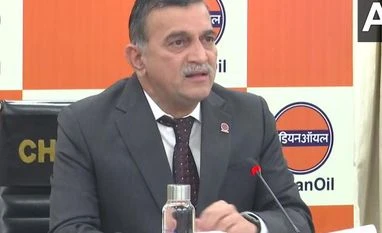Indian Oil Corp (IOC), the nation's largest oil firm, will set up 10,000 charging stations for electric vehicles (EVs) in the next three years as it prepares for the energy transition leading to net-zero by 2070, its chairman Shrikant Madhav Vaidya said on Wednesday.
Prime Minister Narendra Modi on Monday made a bold pledge to cutting emissions at the world's third-biggest emitter to net-zero by 2070.
While IOC sees fossil fuels like petrol and diesel continuing to play a dominant role in meeting India's energy needs in the next couple of decades, the company is setting up the infrastructure to give confidence to automobile manufacturers for enhancement of EV production and to customers for an uninterrupted drive, Vaidya told reporters here.
"Energy pie of the country is growing. We are not a stagnant economy. Overall our energy pie is growing and so all kinds of fuel will be needed to meet the energy needs," he said.
IOC plans to set up 50 KW EV charging stations at every 25-km and 100 KW heavy-duty chargers at every 100-km to weave a network that will provide customers easy access for charging their electric vehicles, he said adding the charging stations would be set up at existing and new petrol pumps across the country.
With the bulk of 28 crore vehicles currently on Indian roads and most of 2.5 crore automobiles being added to the roads every year being either run on petrol or diesel, the requirement of fossil fuel will continue to grow.
At present, battery-powered, called EVs, make up for a small percentage of all automobiles. Of all new 2-wheelers sold, EVs make up for about 1% while the percentage of same in the four-wheeler category is just 0.2%. 25% of new three-wheeler sale is EVs.
Also Read
By 2030, 30 per cent of all new two-wheelers are projected to be electric while 35 per cent of all new three-wheelers would be using electricity as fuel. 15% of four-wheelers sold in 2030 would be EVs, IOC official said quoting projections by different agencies.
"IOC is aligned with what Prime Minister has announced and it is taking the first step toward that," Vaidya said.
The company, which controls roughly half of the nation's fuel dispensing network, will set up 2,000 EV charging stations by October next year and another 8,000 in the following two years, he said.
In the first year, IOC will target setting up 231 EV charging stations in 9 high-priority cities of Mumbai, Delhi, Bangalore, Hyderabad, Ahmedabad, Chennai, Kolkata, Surat and Pune. Another 375 stations would be set up in the second year in these cities and a further 215 in the third year.
In all, 944 charging stations would be set up in other state capitals over the three-year period but more than half of the 10,000 outlets planned would come up on highways and other cities.
He said after accounting for government subsidy, the capital expenditure in setting up the 10,000 EV charging stations would be Rs 150-200 crore.
IOC either had already tied up or is in dialogue with automobile manufacturers, fleet aggregators and electricity suppliers for the EV charging network.
On Monday, India did the unexpected and committed to net-zero carbon emission by 2070, reduction in carbon emissions from that expected till 2030, greater use of renewable energy by 2030 than targeted previously, committing to meeting half of all energy requirements from renewables by 2030 and reducing the carbon intensity of Indian economy to less than 45 per cent from that in 2005 by 2030.
Vaidya said the company would draw electricity from the grid for the EV charging stations which will be in parallel to the network of battery swapping stations it is setting up.
While EV charging could typically take 45 minutes to 3 hours depending on the size of the charging stations, a battery swapping site offers the facility to change discharged batteries for a fully charged one in a matter of minutes.
Battery swapping is mostly done by three-wheelers, he said.
(Only the headline and picture of this report may have been reworked by the Business Standard staff; the rest of the content is auto-generated from a syndicated feed.)
)